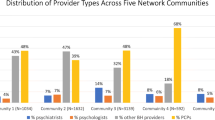Abstract
Numerous behavioral health and social service providers (primarily not-for-profit community mental health and chemical dependency treatment centers) have been joining forces on a local and regional basis to create their own managed care contracting entities, referred to as provider-sponsored networks. Even though these networks are emerging as an alternative managed care model, little is known about them. This descriptive survey provides baseline information about the status of these networks. Using a structured interview questionnaire, a random sample of 15 networks from 12 states was surveyed. Participants were asked about various organizational characteristics of networks, reasons for formation, managed care readiness, obstacles to success, differential value of networks, and recommendations for success. Findings suggest that regional networks are making gradual progress, although many of the assumed benefits have been elusive.
Similar content being viewed by others
REFERENCES
Minkoff, K., & Pollack, D. (1997). Developing community-based networks. Managed mental health in the public sector: A survival manual. Amsterdam: Harvard Academic Publishers.
Treasch, M., & Manfreda, M. (1998). Building value and core competencies: Responding to regulatory and consumer demands. Provider-Sponsored Organizations, 6, 121–141.
Unland, J. (1995). A guide to forming provider-directed managed care network. Chicago, IL: American Medical Association Publication.
Author information
Authors and Affiliations
Rights and permissions
About this article
Cite this article
Sharar, D.A., Weinstein, M. Provider-Sponsored Networks in Public Sector Behavioral Health. Adm Policy Ment Health 29, 3–20 (2001). https://doi.org/10.1023/A:1013161630661
Issue Date:
DOI: https://doi.org/10.1023/A:1013161630661




